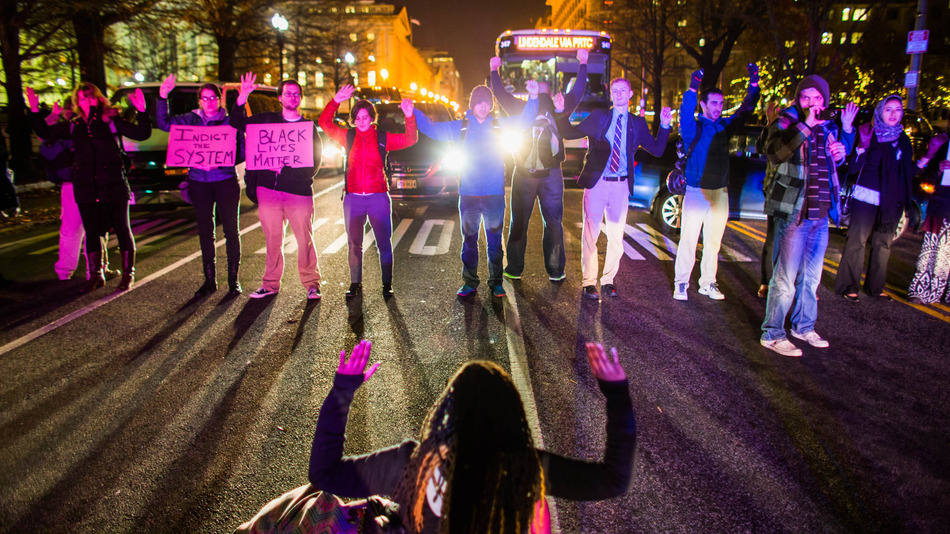
I realise that a white person telling you this bypasses irony and heads straight into direct hypocrisy, but recent evidence suggests we ignore people who can speak with actual authority on racism and instead privilege the voices of mugs like me – which, if true, would indicate that the mugs should at least use said privileged voices to tell you to stop overvaluing their contributions. So, here it goes: we need to stop listening to white people to the expense of people of colour, especially when it comes to issues that disadvantage the latter and not the former.
If you have taken the point already, stop reading this. Go and follow some African-American protesters on Twitter. If you are sceptical about the extent to which white people get disproportionately listened to, then a) the fact that you are still reading this instead of following African-American protesters on Twitter kind of proves the point, and b) just look at what has unfolded with the #CrimingWhileWhite hashtag.
This hashtag originated in response to protests against a Staten Island grand jury’s failure to indict police officer Daniel Pantaleo, who killed Eric Garner in a chokehold. Not long before that, another grand jury let Michael Brown’s killer off the hook. Both victims were black. Amidst demonstrations against racist policing, the hashtag #CrimingWhileWhite was born when a writer for “The Tonight Show With Jimmy Fallon”, Jason Ross, tweeted about a crime he got away with and asked others to tweet their own stories: “OTHER WHITE PEOPLE: Tweet your stories of under-punished f-ups! It’s embarrassing but important! Let’s get #CrimingWhileWhite trending!”
White conversations about privilege
To be clear: everyone agrees that it is important to have conversations about white privilege and policing. That said though we should not lose sight of why it is important. White people are extraordinarily badly placed to inform anyone about racism. Why? Because we were always the problem to begin with. As comedian Chris Rock put it recently: “When we talk about race relations in America or racial progress, it’s all nonsense. There are no race relations. White people were crazy. Now they’re not as crazy. To say that black people have made progress would be to say they deserve what happened to them before.”
That is not to suggest that white people should not make every effort to wake up and smell the privilege. But given that the problem with policing in America is not that white people are treated too well, but that people of colour are treated appallingly, stories of white privilege are probably less important than the stories of police brutality that African-Americans have been airing long before the dawn of Twitter. The extent to which “Criming While White” has awakened white people to anything new is the extent to which those white people concertedly Were Not Listening to the stories that matter most.
Shrill Cosby (@theshrillest on Twitter) summed up the issue thus: “Who is supposed to be reading the hashtag and learning from it?” Shrill noted that while the hashtag intended to deliver “stories of white privilege for other whites to see”, this centred the wrong perspectives: “you could have just listened to black ppl all along”.
Circular re-exercising of privilege
Others on Twitter observed that engaging in the hashtag to becry white privilege constituted a somewhat circular re-exercising of that privilege: @SONYAEelise summarised it as “Admitting to #CrimingWhileWhite, unafraid of social and/or criminal retribution”. Paying attention to Criming-While-Whites, then, entails not only individually letting racial bias colour whose voices you think matter – it also means you are elevating a form of anti-racist activism that people disadvantaged by racism are genuinely unable to deploy, precisely because of the racial bias that would ensure negative consequences for them if they did what white tweeters are doing.
Look. I am very obviously in no position to say whether the hashtag is helping or hindering the movement to hold racist police to account. Aside from anything else, activists are themselves divided on the issue – it would be absurd to expect a homogenous black opinion on this, or on any, matter. But whether or not #CrimingWhileWhite is necessary or useful, it can only be necessary or useful for as long as we think the people victimised by police brutality are unable to give a complete account of their own oppression.
Whatever the instrumental value of white people coming forward with tales of their racial advantage, it would probably be good to work on the fact that we, white people, are creating the circumstances in which this could ever be the case. And on that note, I will now shut up. Go and follow Shrill on Twitter. Like TheRoot.com on Facebook. This article itself can only be telling you anything new if you were failing to listen to black Americans.






